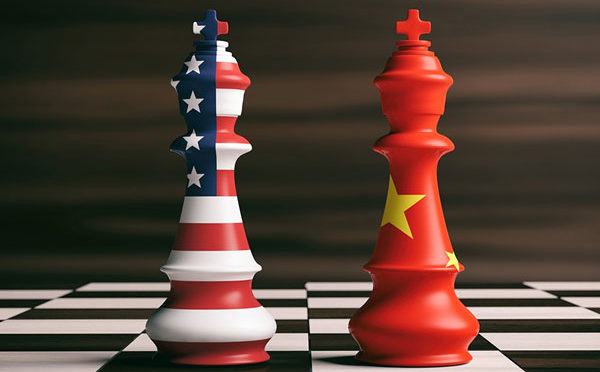Can the US- China relations recover with Joe Biden as the new US President?
Posted on : March 23, 2021Author : Ankita Chatterjee

Sino American relations plunged into a nadir during the four years of the former US President Trump’s administration. It deteriorated further in the year 2020 during the COVID-19 pandemic when former President Trump threatened to “cut off the whole relationship” and also threatened to seek compensation from China for the damages caused by the virus outbreak. Beijing and Washington traded blame over the coronavirus pandemic, got involved in trade war, competed over 5G networks and other technologies and also clashed over the human rights abuses in Xinjiang and Hong Kong, among other issues. The rising tension between the two giant powers prompted many experts to warn of a new cold war.
Now, the administration under Joe Biden as the new US president offers a chance to examine the relationship anew. While the Biden administration offers the possibility of a reset in the US-China relations, some potent structural factors within the US make it likely that zero-sum competition will continue to dominate its approach towards China. The US approach is expected to be based on realism and would be more calculated than Trump’s loud anti-China rhetoric. Also, the US would continue to oppose Xi Jinping’s rising authoritarianism in China and elsewhere.
China welcomed the new Biden Presidency with its expectations of healing a severely damaged bilateral relationship. Also, China said that the two countries should focus on cooperation and manage their differences. On 10th February, President Biden spoke with China’s President Xi Jinping and expressed the US concerns of its policy towards China. In the call, Biden put forth his concern for a free and open Indo-Pacific region. Biden also expressed his concerns with Beijing’s aggressive policies abroad and human rights abuses in Hong Kong and Xinjiang. The two leaders also shared concerns regarding global health security, climate change and prevention of weapon proliferation. President Xi, on his part, warned Biden that a confrontation would be a disaster and that the two countries should seek to re-establish their relations in a positive way.
President Xi has policy priorities, both at home and abroad, that he won’t change for Biden. He seems to be pressing for “self-sufficiency” to limit China’s reliance on the US and Biden’s influence over the Chinese economy. President Xi places more stress on domestic development and thus may shift the focus of policy inward. This, too, could heighten tensions with the US if President Xi substitutes imports with domestic products or further discriminates against American companies. Moreover, the landmark investment deal between European Union and China also includes US allies like Japan, Australia and South Korea. This could be a major irritant for Biden as coordinating with allies is the keystone of Biden’s economic agenda against China, aiming to unite a global bloc of market-based economies to influence Beijing’s trade practices.
Biden’s presidency is likely to adopt an approach aimed at countering the Chinese aggressive activities and violation of international law by strengthening bilateral and multilateral alliances through closer diplomatic, political and military ties with its allies and partners. Also, the Biden administration is likely to keep a strong watch on China’s proliferation of weapons. The Sino-Pakistan axis to help Turkey acquire nuclear weapons could become a serious issue. The Trump administration had imposed a series of restrictions and penalties on China along with high tariffs on Chinese goods. To reverse them will be technically and politically difficult for President Biden. Hence, some frictions between the two powers cannot be ruled out.
China expects less volatility with the US under Biden but does not see a significant change in the US hardline approach towards it. In addition, China has lost a lot of credibility in its diplomatic field due to the COVID-19 pandemic which emerged in the Chinese city of Wuhan. So, China seems keen on rebuilding its image which has been severely marred by the pandemic. Biden and his team on the other hand have voiced concerns about China’s tech and industrial ambitions and policies. They have also argued for an approach less focused on Trump’s decoupling and punitive measures, and instead more on constructive measures to strengthen the United States’ domestic tech innovation and working with international partners to set global standards. Besides, climate policy will feature prominently in the President Biden’s administration’s dealing with China. With the US now re-joining the Paris Accord, some cooperation is expected in the issue of climate change. However, the question is whether the US will favor a more cooperative approach to construct global alliances or a more competitive one that highlights America’s ability to combat climate change while emphasizing the gap between China’s lofty climate claims and its often-lagging follow through.
Russia could also be a key player in the Sino-US relations. Both China and Russia are largely motivated by strong anti-American sentiment. The shift in the US policy towards China has potentially increased the value for closer cooperation with Russia for China. However, certain obstacles prevented both the countries from entering into a fully-fledged alliance. Also, Russia has limited its capability to help China economically in rivalry with the US. Despite this, both Russia and China equally appreciate each other’s support but are not bound to each other tightly. In this background it is significant to remember that US, India, Australia and Japan held their first meeting of the “Quad” since President Biden’s inauguration. There were virtual talks on issues like COVID-19, climate change, restoration of democracy in Myanmar and advancing a free and open Indo-Pacific region. This dialogue was driven by shared concerns over China’s growing power and influence.
How the Biden administration frames the US-China relationship with its intention to better align foreign policy and domestic economic interests will also be revealing. President Biden said that more effective competition with China will require more investment in ‘America First’, in the US technology and more cooperation with other countries to ensure a fair trade with China. The future evolution of the relations between US and China will be critical and is therefore being watched globally with interest and anticipation.
Ankita Chatterjee
Intern, Asia in Global Affairs





Leave a Reply